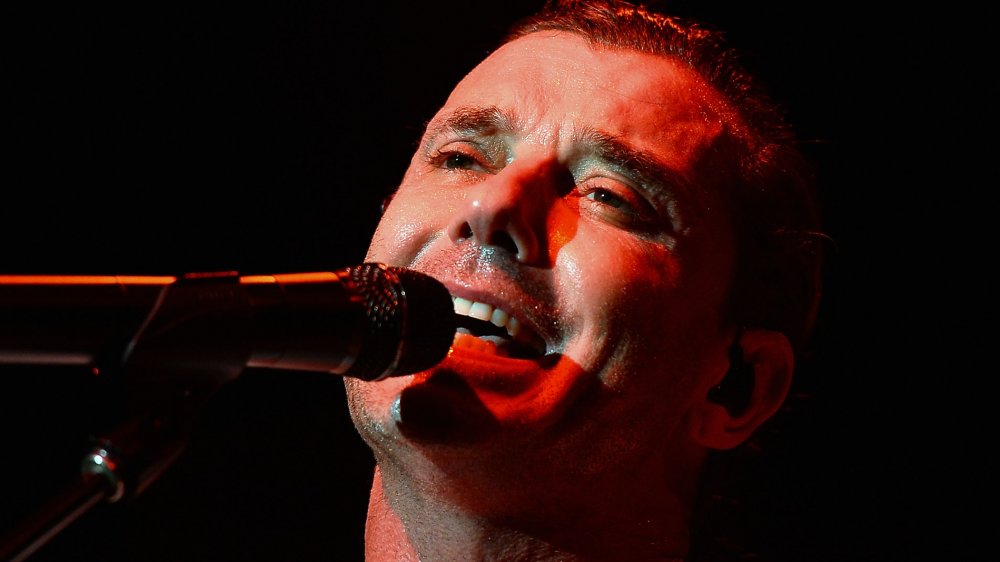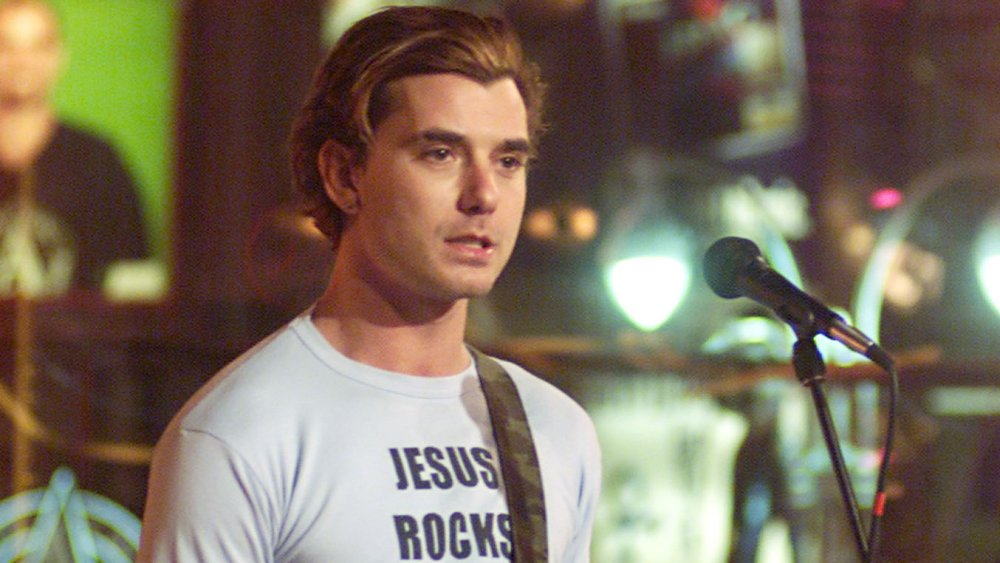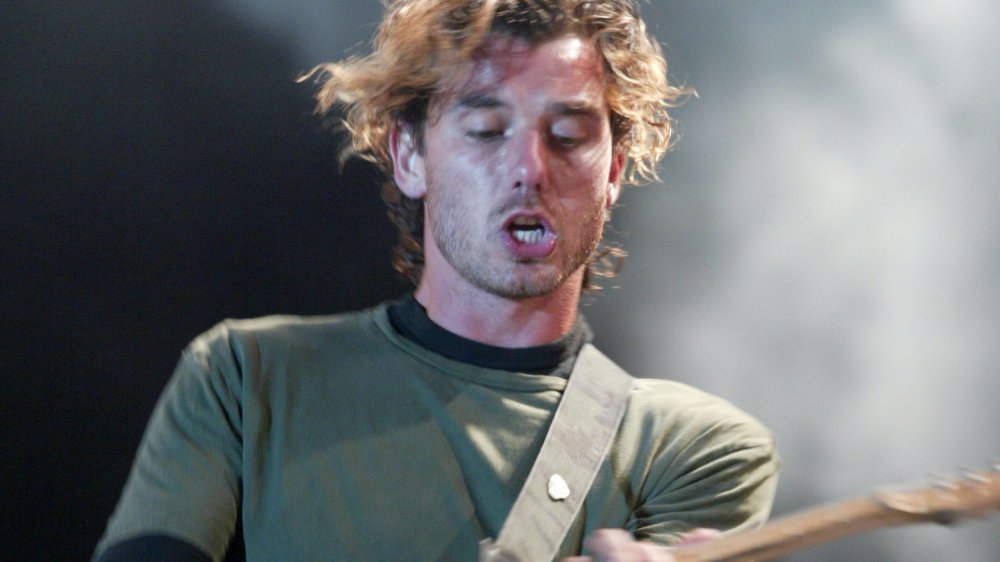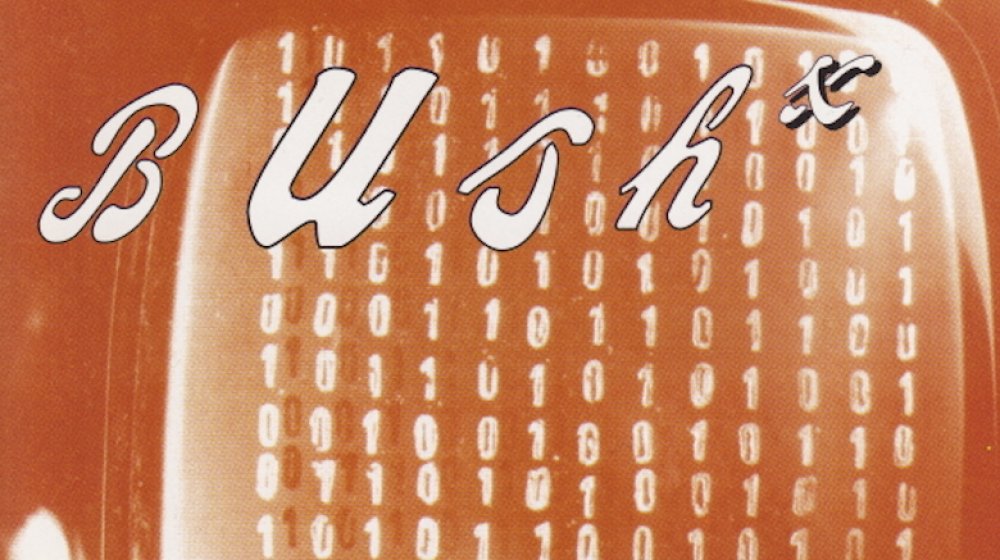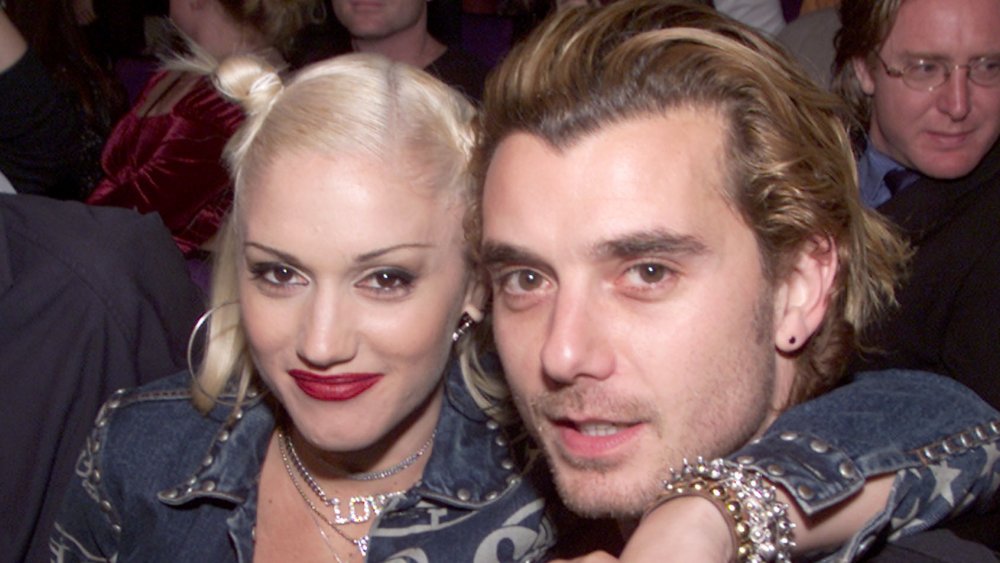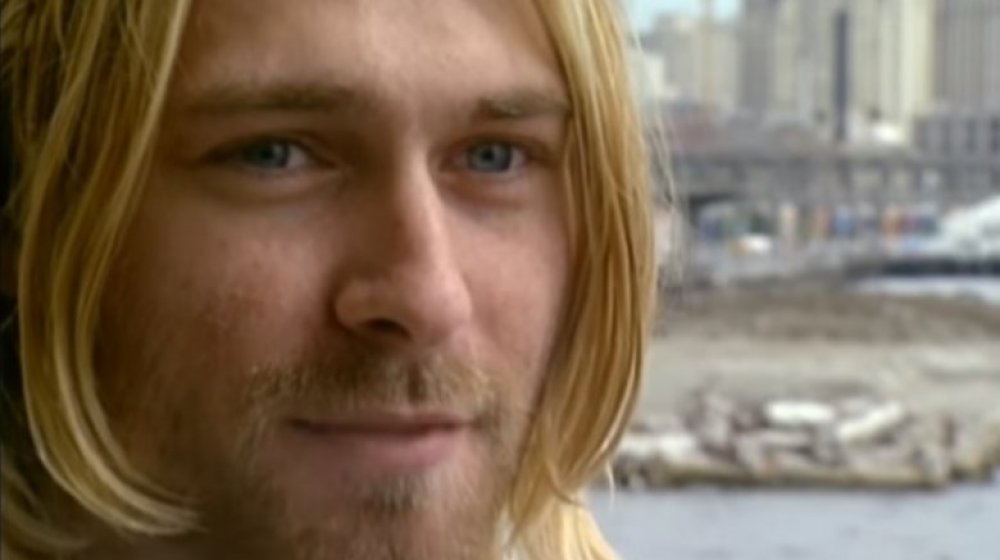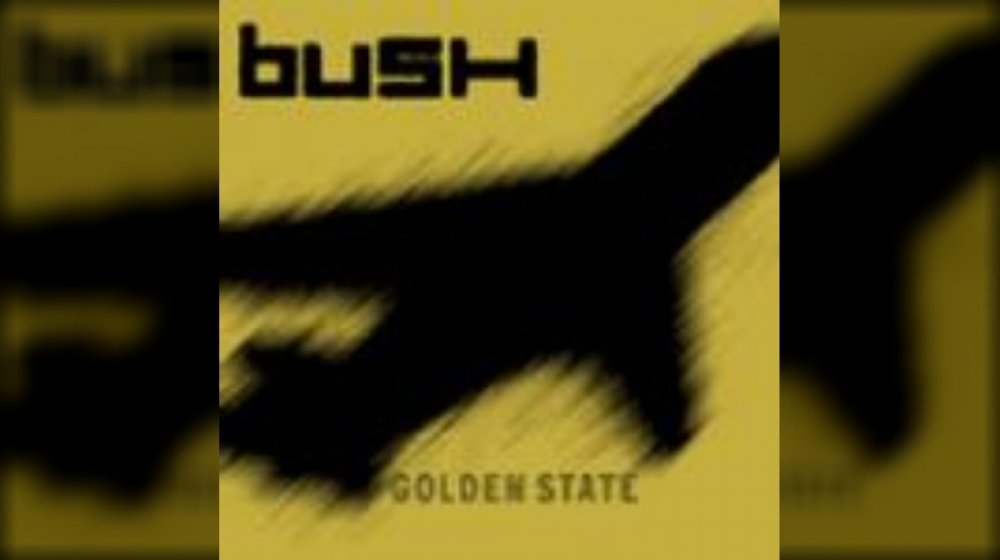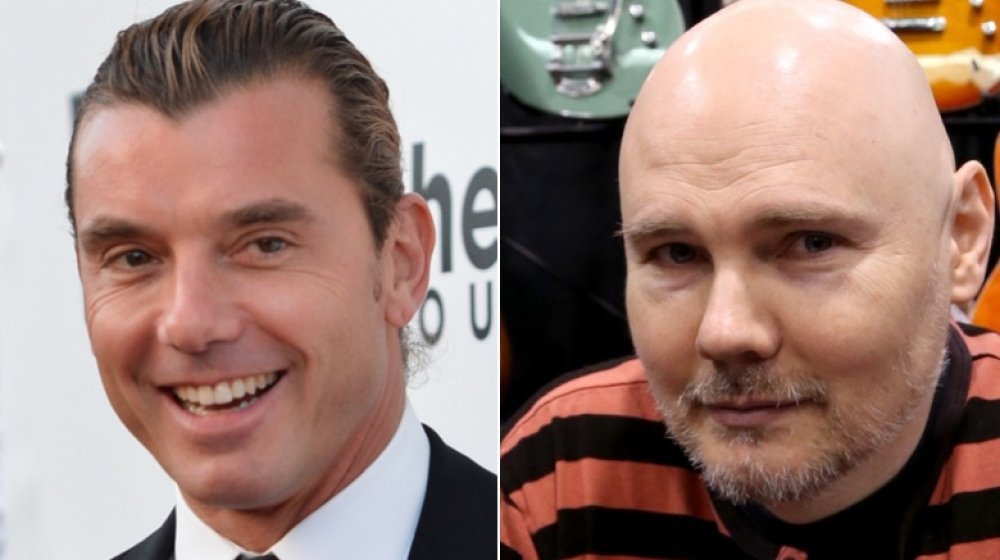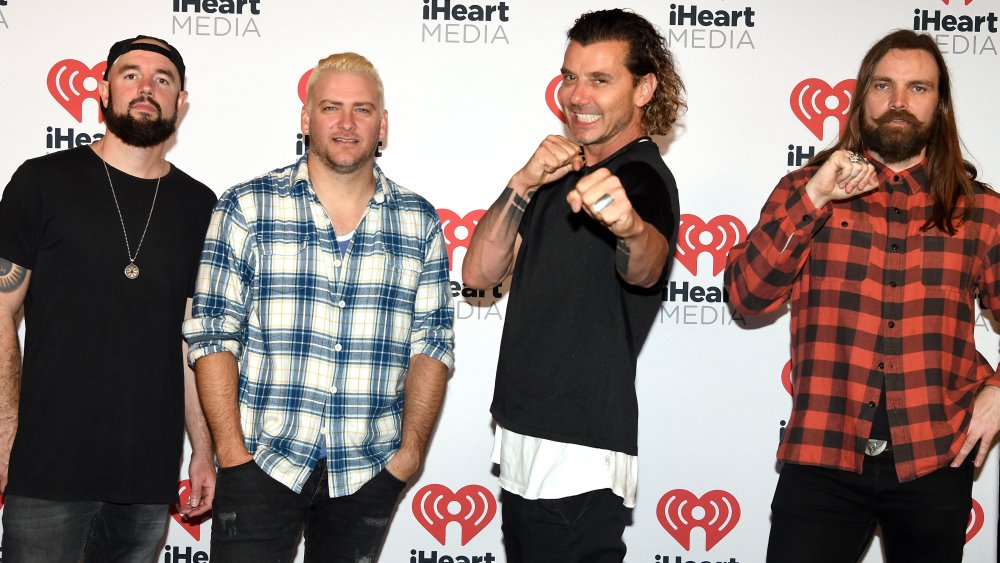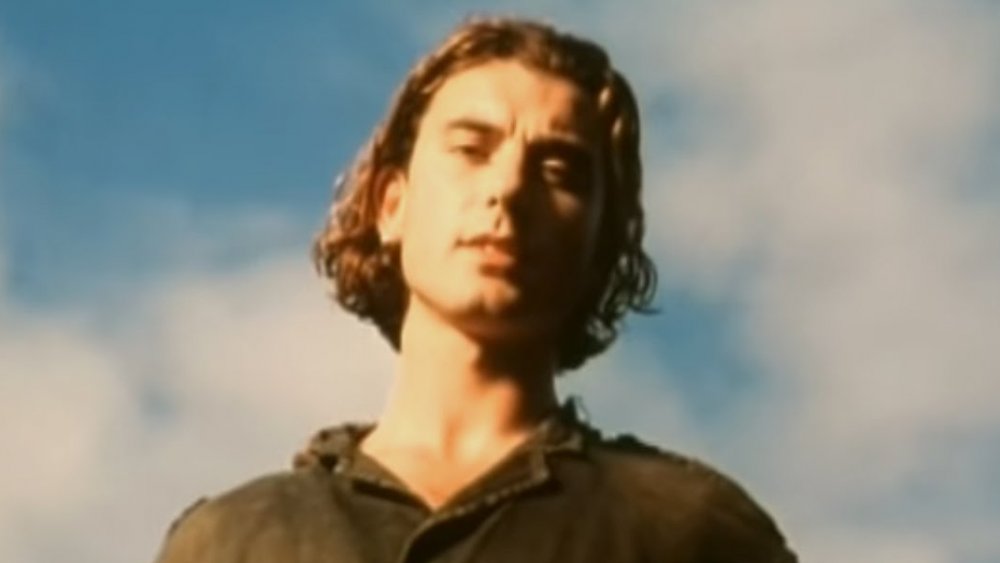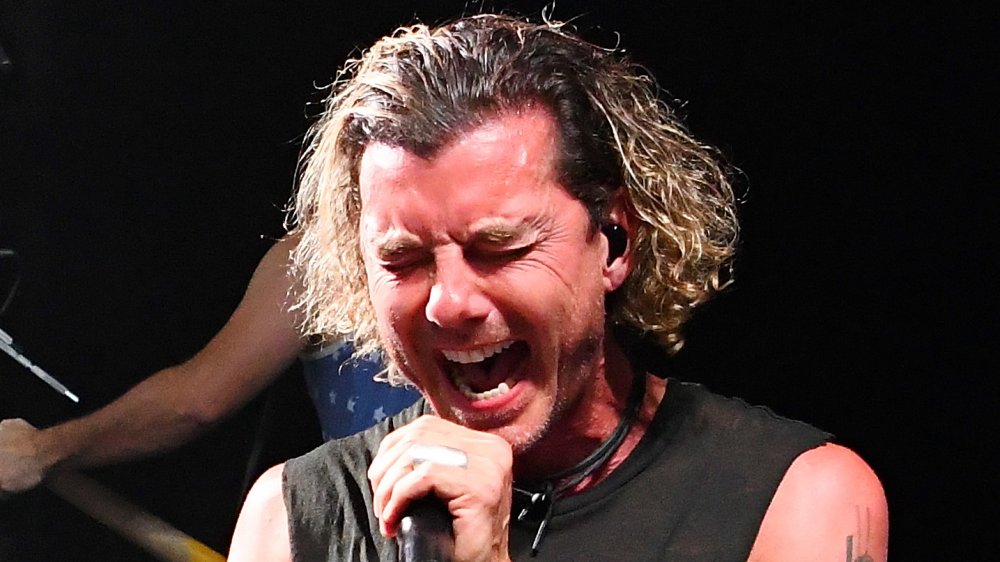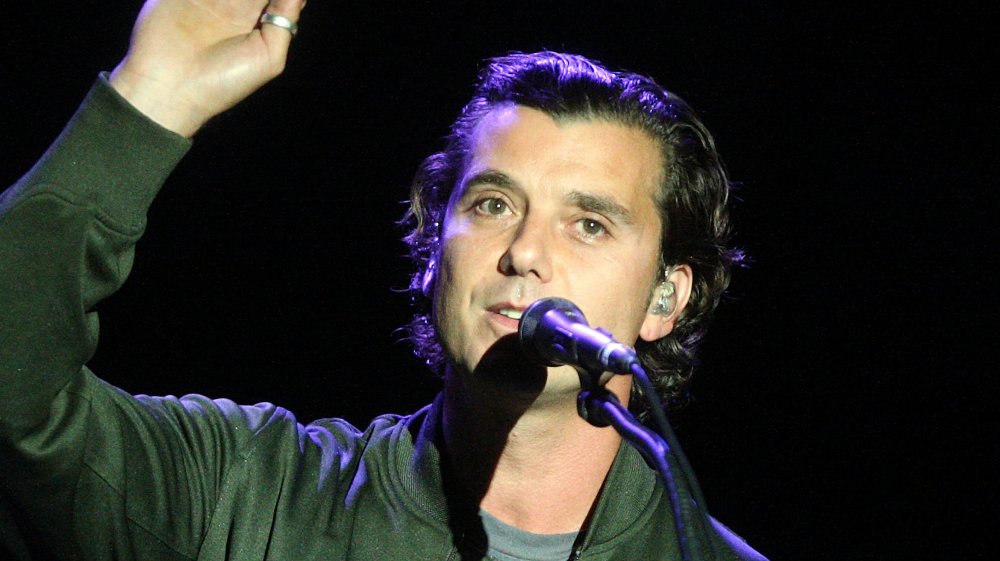The Untold Truth Of Bush
After the first wave of grunge bands — Nirvana, Pearl Jam, and Soundgarden — changed the face of mainstream rock in the early '90s with its monster guitar riffs, punk attitude, and cryptic-meets-melancholy lyrics, along came a British Invasion. And leading the charge of alternative rock bands from England was Bush, a group that sounded right at home on the radio alongside the likes of Alice in Chains and Smashing Pumpkins, with its distortion-heavy, grumbly voiced songs like "Everything Zen," "Machinehead," and "Glycerine."
Bush was largely the vehicle for its founder, chief songwriter, and singer Gavin Rossdale. The band sold millions of copies of its albums (and it didn't hurt that Rossdale possessed the good looks of a male model). Bush churned out big, bombastic alt hits well into the new millennia before giving way to newer, fresher pop-rock bands. And with its first new album years on the way, the English group is primed for a big comeback in 2020, so here's a look back at the long and explosive history of Bush.
How Bush got its name
After graduating from high school in the mid-1980s, Gavin Rossdale became a regular on London's burgeoning dance club scene, and with another club kid named Sacha Puttnam, he formed a fluffy pop group called Midnight. Two singles didn't get any radio or sales traction, and he couldn't make any headway with a series of short-lived bands, either. But after meeting guitarist and fellow Pixies superfan Nigel Pulsford, he formed a pop-rock group called Future Primitive, which a record executive told Rolling Stone sounded like "the more commercial side" of '80s hitmakers INXS.
Before long, they'd added drummer Robin Goodridge and bassist Dave Parsons, who, like Rossdale, had tasted the big-time earlier, having played in the controversial English glam rock band Transvision Vamp. Now all the group needed was a name, or rather, a better one than Future Primitive. So the band went with Bush, short for Shepherd's Bush, the name of a London suburb where some of the members had once resided.
Bush's big break had to wait
Once Future Primitive became Bush and the group found its sound, it took a frustratingly long amount of time for the band to release its debut album, owing to some corporate snafus that the group had nothing to do with. Veteran talent manager Rob Kahane became acquainted with Bush in 1993, shortly after he'd stopped managing George Michael. He heard the band play a few songs (all of which would go on to become hit singles) and signed the band to Trauma, his small, upstart record label, which had a distribution arrangement with Hollywood Records, a division of Disney.
So Bush headed into the studio, and by early 1994, the group had fully completed recording its debut album Sixteen Stone. Then Disney executive Frank G. Wells died in a helicopter accident. As he was Kahane's closest advocate in the Disney corporate world, the manager and his bands were no longer necessarily welcome at Hollywood Records. Some executives decided that Sixteen Stone wasn't a good enough album for commercial release, and so the members of Bush temporarily had to work low-paying, part-time jobs to pay the bills, hoping Sixteen Stone would see the light of day eventually. Fortunately, Kahane found a home for both the band and album at Interscope Records. It went on to sell 6 million copies, meaning Gavin Rossdale and the other Bush guys were able to quit their day jobs.
Bush had a completely different name in Canada
Alternative rock enthusiasts of a certain age will remember Bush as one of the most dominant bands of that genre from the mid-1990s to the early 2000s. Well, fans of rumbling, downbeat hard rock from everywhere but Canada remember Bush. That's because up in the Great White North, the group was known by a different name. So what's the story there?
Well, a band's name is its brand, and as such, it can and will file for a trademark. (Otherwise, there would be hundreds of bands running around calling themselves "the Beatles" and those bands would not include Paul McCartney or Ringo Starr.) And in the early 1970s, Canadian musician Domenic Troiano formed a band called Bush, which released a single, self-titled album. As such, Troiano owned the Canadian territorial rights to use "Bush" as a band name.
At the urging of his lawyer, Gavin Rossdale's grunge band had no choice but to pick a name just different enough from Bush to be legally compliant but also close enough to Bush so Canadians would know it was the same band. The solution? For some of its earliest releases, Bush was known in Canada as BushX. Troiano and Bush(X) eventually came to an agreement, and the latter, more famous Bush is now known by that name worldwide.
How Gavin Rossdale found Love on tour
The world of professional rock music is ultimately a small group, and people in close proximity together will eventually pair up. And the king and queen of the '90s alternative rock prom were Gavin Rossdale of Bush and Gwen Stefani of No Doubt. The pair met when their bands toured together, and in 2002, they got married. The rock star couple had three sons together, but ultimately, they filed for divorce in 2016.
But let's go back to their mid-'90s dating days, which also involves a third party, herself another big star of the era. In an interview on The Howard Stern Show (via Us Weekly), Hole singer Courtney Love claimed that after Rossdale got together with Stefani, he cheated with her "and a few other people." Love added that Rossdale "was such an Adonis in his day" but that friends gave her grief "because Gavin sounded like a lot like Kurt," meaning Kurt Cobain, Love's late husband and Nirvana frontman.
Years later, Hole picked on Stefani, derisively calling her a "cheerleader" in Seventeen (via The Cut) and alleging that Rossdale was the brains and brawn behind Stefani's successful fashion line. "Someone one time called me a cheerleader, negatively, and I've never been a cheerleader," Stefani later told NME (via We Are the Champions). "So I was, like, 'Okay, f*** you. You want me to be a cheerleader?'" With that inspiration in mind, Stefani wrote and recorded "Hollaback Girl," a #1 pop hit.
The band is well aware of the Nirvana comparisons
The Nirvana sound was highly influential to successor '90s bands, such as Bush, which debuted with Sixteen Stone in late 1994, months after the death of Kurt Cobain and the end of Nirvana. And Bush's aural similarities to Cobain's power trio were a little too much for some people, and the group was frequently and unfavorably compared to Nirvana and written off as a clone.
So how did the members of Bush respond? "A lot of people want to guard Kurt Cobain's estate, and I appreciate that, but what we're doing isn't a crime," Rossdale told Rolling Stone in a feature cattily titled "Nirvanawannabees." "I hope there's something of Nirvana in Bush, in the same way that there was a massive element of the Pixies in Nirvana." In an interview with Guitar World (via Orleans is Drowning) in 1997, Bush guitarist Nigel Pulsford dismissed the criticism entirely. "There are a million Nirvana sound-alike bands," he said. "If we really wanted to sound like Nirvana, we could get a lot closer."
When it came time to record the band's second album, Razorblade Suitcase, Bush didn't seem to care about the "Nirvana knockoff" label anymore. The group almost invited the criticism, hiring as its producer Steve Albini, a studio wizard known for his work with indie bands, punk acts ... and Nirvana's 1993 album In Utero. Talk about sticking it to the haters.
Bush had to change a song after 9/11
The events of September 11, 2001 were not only unspeakably tragic, and they not only introduced Americans to the idea of living under constant fear of terrorism, but the ramifications of the tragedy were also felt in pop culture. Scenes featuring the destroyed World Trade Center were removed from films, movies with hijacking or terrorism storylines were delayed, and potentially triggering song titles were rethought. For example, RCA Records pulled the Dave Matthews Band single "When the World Ends," Jimmy Eat World changed the song "Bleed American" to just "American," and Bush had to make changes to both a forthcoming album and its lead-off single.
The cover of the band's fourth album, Golden State, originally depicted a blurry image of an airplane. Atlantic Records scrapped that in favor of a simpler, non-offensive approach: a gold background with the name of the group and album title. As for the first single, "Speed Kills" had already been released, but after radio juggernaut Clear Channel Communications placed the song on a list of songs inappropriate to play after 9/11, Bush renamed it after a line from the tune — "The People That We Love." According to a statement on Bush's website (via Chart Attack), the band said, "Since the song is one of love, appreciation, and rising against adversity, we hope that this change will reflect our desire to be part of the soothing that art brings at these times."
Bush vs. Smashing Pumpkins
Bush and Smashing Pumpkins were making names for themselves at the same time, rocking a similar sound and earning wealth and fame. But while they were in the same successful, adored club, there was no love lost between the two groups. In fact, the members have Bush have taken multiple shots at Billy Corgan and his alternative rock band over the years.
When discussing Bush's similarities to Nirvana, Bush guitarist Nigel Pulsford called out the Pumpkins for also being derivative and worse. "Gish came out, and it sounded like Jane's Addiction," he told Guitar World (via Orleans is Drowning) in 1997. And as for the Pumpkins' sprawling, double album Mellon Collie and the Infinite Sadness, Gavin Rossdale said it marked the band's arrival as "some sort of a hi-fi coffee-table rock band," adding that, "It's quite heavy metal, some of it? I think it's horrible." Smashing Pumpkins ultimately got the last laugh, in a sense, winning the Grammy for Best Hard Rock Performance in 1998 for "The End is the Beginning is the End" over Bush's "Swallowed."
The surprisingly complicated story of a seemingly dumb Bush lyric
After numerous years and hits together, Bush may still be best remembered for its first single, the alternative rock radio smash "Everything Zen" from 1994. It's loaded with hooks and sing-along moments, perhaps none more ear-catching than Gavin Rossdale repeatedly intoning that "there's no sex in your violence." Yeah, it was a little risqué for the radio in 1994, and it remains inscrutable. However, it wasn't written to be provocative. Instead, that seemingly salacious lyric from a hard rock song has a lot of personal meaning for Rossdale.
"One band that really inspired me at the time — and always, forever — was Jane's Addiction. I had seen a show of theirs, and they have that line 'sex is violent,'" Rossdale told Songfacts, referring to the song "Ted, Just Admit It..." He went on to add, "I thought about that line, and it always struck me as a powerful lyric." Rossdale said when writing the song, that one lyric led to thoughts about his childhood in London, which was often marked with violence, as well as the realization that "sex and violence" is a recurrent theme in art. "I just decided to put it in the context of, 'There's no sex in your violence.' It's sort of a personal belief, a personal mantra."
How a misheard Bush lyric created a one-hit wonder
Bush was well-loved in the mid-1990s, and the band was very much of its time. But when compared to contemporaries like Foo Fighters or Weezer, it isn't spoken of much today. Also well-loved in the mid-1990s, very much of its time, and mostly forgotten today? The smash hit 1998 single "Kiss the Rain" by British one-hit wonder Billie Myers. And it only exists because a powerful music industry figure misheard Bush's hit "Glycerine."
Desmond Child is a songwriter and producer who created Bon Jovi's radio-friendly, pop-metal sound, and he extended that dynamic to Aerosmith and Alice Cooper, helping those acts make big comebacks in the late 1980s. In the mid-'90s, he'd agreed to work with Myers but still had to do some work for Jon Bon Jovi. While working out together in the singer's gym one day, Bon Jovi put on a Bush record. "There's a song, and I keep hearing 'kiss the rain,' and I said, 'That's a b*****d, that's such a great title," Child told Billboard in 1999. Bon Jovi informed the producer that Bush singer Gavin Rossdale was actually singing "glycerine." That made Child realize that "kiss the rain" was "an incredibly fresh title," and he asked Bon Jovi to write a song of that name with him. Bon Jovi thought it was "stupid" and "turned it down instantly," so Child saved the idea for Myers.
Bush went electronic before it was cool
Around 1996 and 1997, the music industry pushed (and music publications promoted) the notion that electronic-based music was going to be the biggest thing in recorded noise since grunge — with its buzzing guitars and bummed-out singers — had defined early '90s pop culture. And while a handful of bleeps-and-bloops bands found success — the Prodigy's The Fat of the Land hit #1 on the Billboard album chart, while Moby and Daft Punk have endured to this day — pre-existing rock bands tried to adapt, either out of the perception that they needed to stay relevant or because they were genuinely interested in evolving their sound with keyboards and computers.
Bush was among the first to embrace the styles known under the umbrella term of "electronica." In 1997, the group released Deconstructed, an album of its songs remixed by the better-known DJs and electronic musicians of the day, such as Goldie and Tricky. The album's big single was a new Bush song called "Mouth," layered with robotic noises provided by a previously unknown DJ named "the Stingray." Who was Stingray? Why, it was none other than the members of Bush themselves.
Introducing Bush 2.0
In January 2002, founding Bush guitarist Nigel Pulsford announced on Bush's website (via MTV News) that he was temporarily quitting the band, forgoing touring to stay at home with his wife, who was at the time pregnant with their son. A few months later, however, Pulsford claimed to Undercover (via Blabbermouth) that he'd wanted to leave much earlier, and then he was ultimately fired anyway. "The decision was taken out of my hands when I was sacked six days after the birth of my son," Pulsford said. "I'd tried to quit in September when there were complications during my wife's pregnancy, and I didn't see how I could continue, but I'd been persuaded to carry on by getting a temporary replacement for the U.S. tour."
In other words, it wasn't a happy split. And thus, Pulsford's temporary substitute, former Helmet guitarist Chris Traynor, became his permanent replacement ... but not for long. Rossdale disbanded Bush in 2002. Three years later, Rossdale re-emerged with a new band called Institute. He brought along Traynor and got the guitarist's Helmet mate Paige Hamilton to produce Distort Yourself, a commercial flop that would turn out to be the group's only album. Rossdale's sole solo effort, Wanderlust, sold moderately well, and the single "Love Remains the Same" hit the top 30, but then he reformed Bush in 2010, albeit without Pulsford and bassist Dave Parsons.
